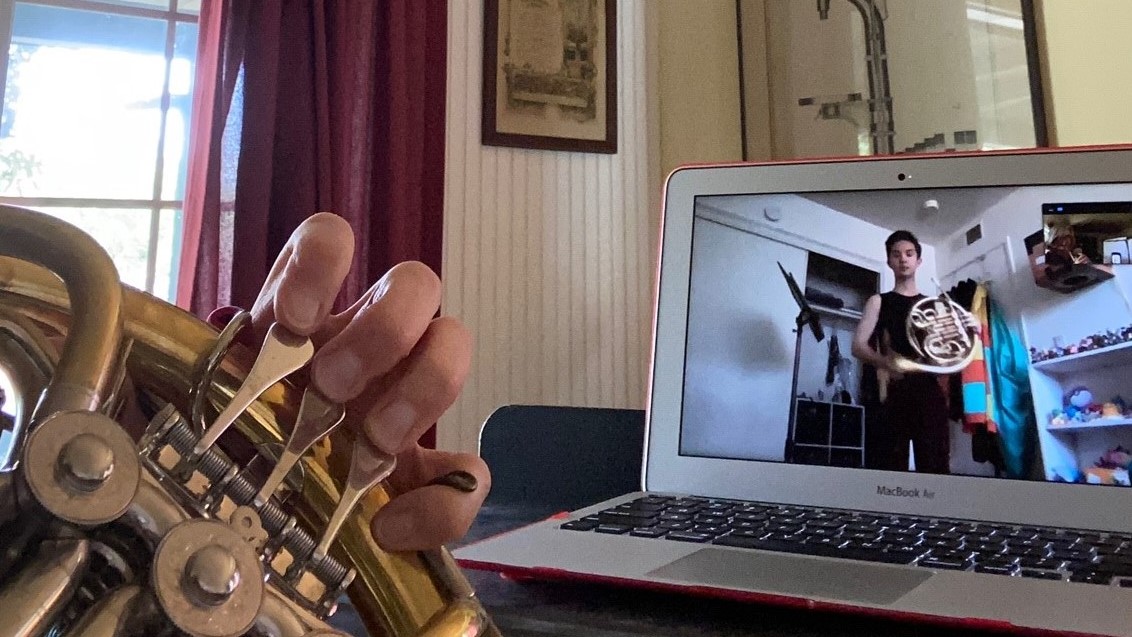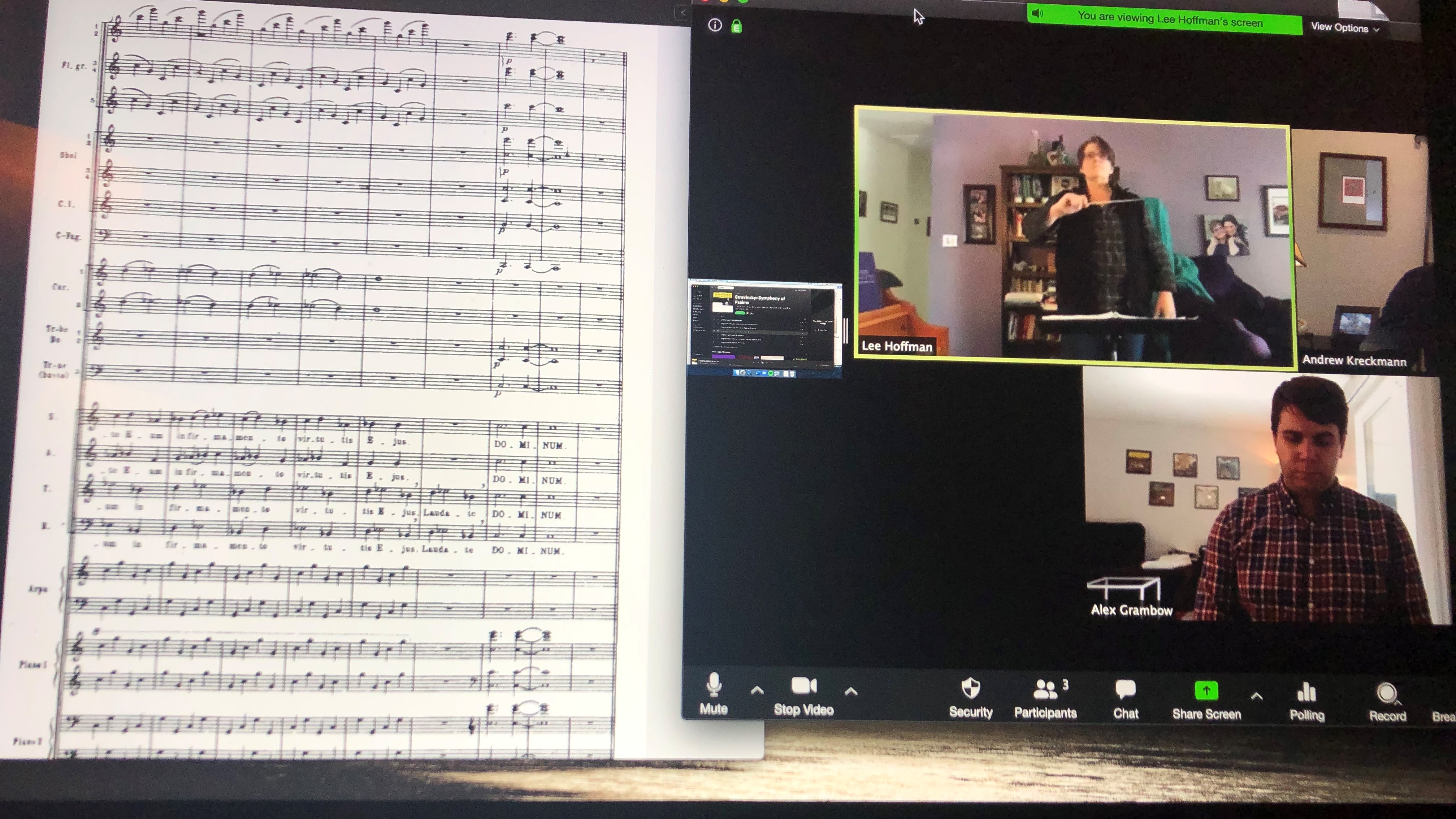 The collaboration and feedback necessary in music education take various forms with in-person teaching not being a current option for faculty, including horn lecturer Jennie Blomster, left, working with student Ryan Datar. (Photo courtesy of Jennie Blomster)
The collaboration and feedback necessary in music education take various forms with in-person teaching not being a current option for faculty, including horn lecturer Jennie Blomster, left, working with student Ryan Datar. (Photo courtesy of Jennie Blomster)
By Ahmed V. Ortiz
The social isolation and distancing caused by the COVID-19 crisis present especially daunting challenges for Sacramento State’s music faculty and students, for whom collaboration is the essence of their curriculum.
Virtual education in a field where timing, precision and sound clarity are so important, is not always a straightforward path. The people at both ends of the virtual interfaces are managing a situation that, at least for now, gives rise to both innovations and questions.
But music is being made, as work-arounds are considered and employed, with some being more complex than others and with varying degrees of success.
 Conducting choral music has its own set of challenges in an education environment dependent on virtual platforms. (Photo courtesy of Andrew Kreckmann)
Conducting choral music has its own set of challenges in an education environment dependent on virtual platforms. (Photo courtesy of Andrew Kreckmann)Choirs face a particular challenge. Readily accessible technology has yet to emerge to allow their members to sing across virtual platforms in sync and in real time. Andrew Kreckmann, the University’s choral director, said lag times in online meeting platforms such as Zoom, the use of which has grown significantly during the pandemic, depends on the strength of each student’s computing device and broadband connection.
Choirs’ attempts to sing online in real time, Kreckmann said, typically haven’t gone so well. And without proper planning and resources, they won’t, he said. Kreckmann pointed to conductor/composer Eric Whitacre, whose virtual choirs have drawn thousands of participants worldwide and collected millions of YouTube views, as someone with the resources to employ needed technology.
Even without that level of help students can succeed in the virtual world, Kreckmann said, provided students have “the tools and steps to make their vocal submission work.”
“Will there ever be a possibility to have a 60-member choir stream into a perfectly timed rehearsal?” Kreckmann asked rhetorically. “No. But it doesn’t mean that they can’t be provided the help to submit a recording of their individual voice part that would then be layered into a single audio track.”
He said School of Music Director Ernie Hills and the Director of Bands Matthew Morse have had preliminary discussions about what technology – and technological support – would be required to make virtual ensembles viable.
There’s no substitute for in-person collaboration though.
“Music is ultimately about collaborating and connecting – making an impression and getting a response,” said Jennie Blomster, a Music lecturer who teaches horn. As much as recordings provide a work-around, she said, they aren’t a perfect facsimile.
The challenges come to musicians other than those who play or sing. Arianna Guntvedt is scheduled to finish her Music master’s degree this spring with an emphasis on Instrumental Conducting. Her culminating project, traditionally a concert recital conducted before a jury, has out of necessity morphed into a write-up of the six pieces she chose for her recital and the techniques she would have applied in it.
“This is something I’ve been working on throughout the last year to give a performance,” said Guntvedt, winner of the Gladys Stone Wright Scholarship awarded by Women Band Directors International. That performance also would have included an oratory element.
She had been rehearsing since fall with a group of about 50 of her fellow students and recent graduates of the school for the concert. “I have video of me rehearsing with the group and what we wanted to do with the music,” Guntvedt said.
The abrupt loss of access to instruments also creates issues. Amanda Lopes, a junior majoring in Music Education who plays in the Symphonic Wind Ensemble, points to a class on percussion methods. At midterm the class typically switches to more complex – and costly – percussion instruments such as marimbas and xylophones.
“For a snare drum, if you have a pair of sticks and a hard surface, you can drum,” she said. “Not everybody has a marimba.”
Fellow aspiring music educator Layla Dean was about six weeks – or as she said, “10 maybe 12 hours of instruction” – into her first classroom teaching job, through a program run by Sacramento Mandarins, instructing first- through third-graders in choir when the world tipped sideways. Even having grown up with computers, she said she has found moving lessons online challenging. She runs her classes, including creating lesson plans, through Google Classroom and also is utilizing FlipGrid, a free app geared toward education.
Dean is conscious about not overloading her very young novice students with information that is less than essential.
“I’ve been kind of overwhelmed with professors sending emails and updates about assignments and … all that sort of thing,” said Dean, a student of Kreckmann’s. She plans to pursue a doctorate and eventually direct a university choir.
Lopes, who with Dean is working on restarting the University’s student chapter of the National Organization for Music Educators, also admitted to some overload. Her twice-weekly conducting class is highly driven by in-person, immediate feedback. Since the move to online, students have been asked to record themselves conducting, followed by Zoom meetings for professors’ feedback, then another evaluation after that meeting, another recording, uploading files for review, and then Zoom calls for further feedback and information.
“It just became a lot,” she said.
Guntvedt said she is concerned about the loss of immediacy, considering that o much of what Music students do also depends on audience feedback.
“Without an audience and without people to play for it’s like, why?” she asked. “Our discipline is centered around performing and being prepared to perform. We cannot be prepared to perform if we don’t have an audience to do so.”
